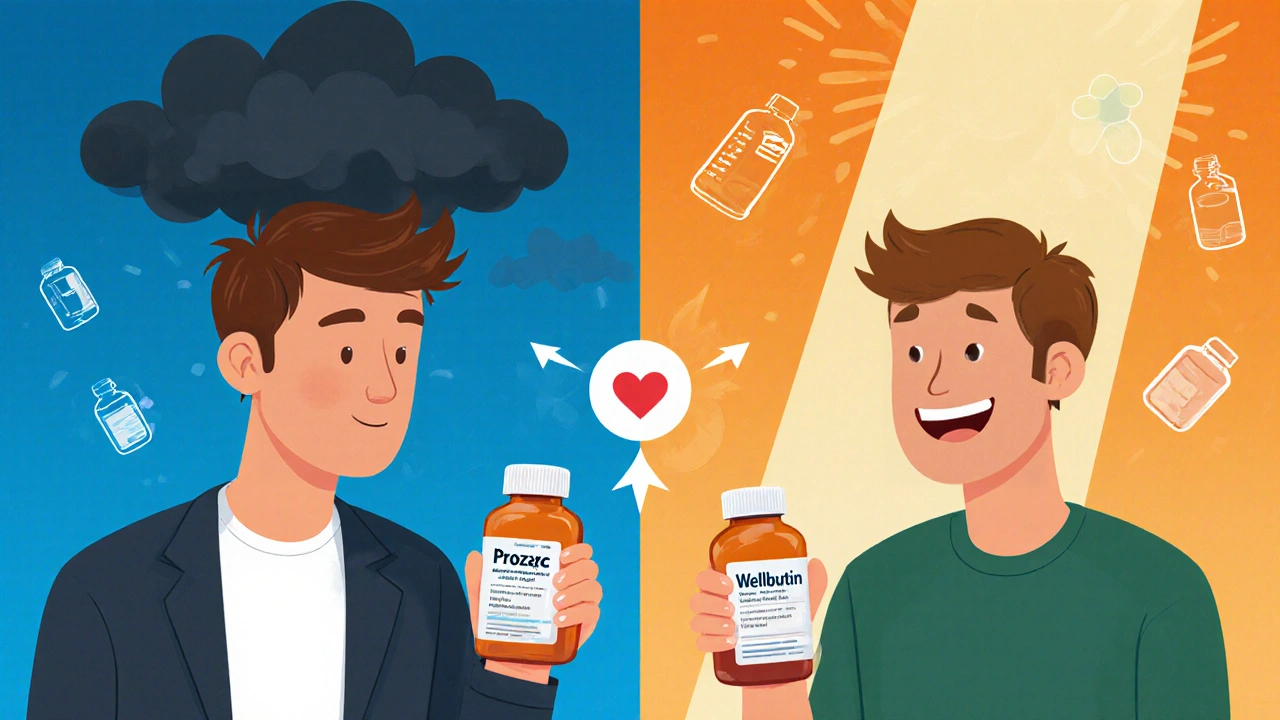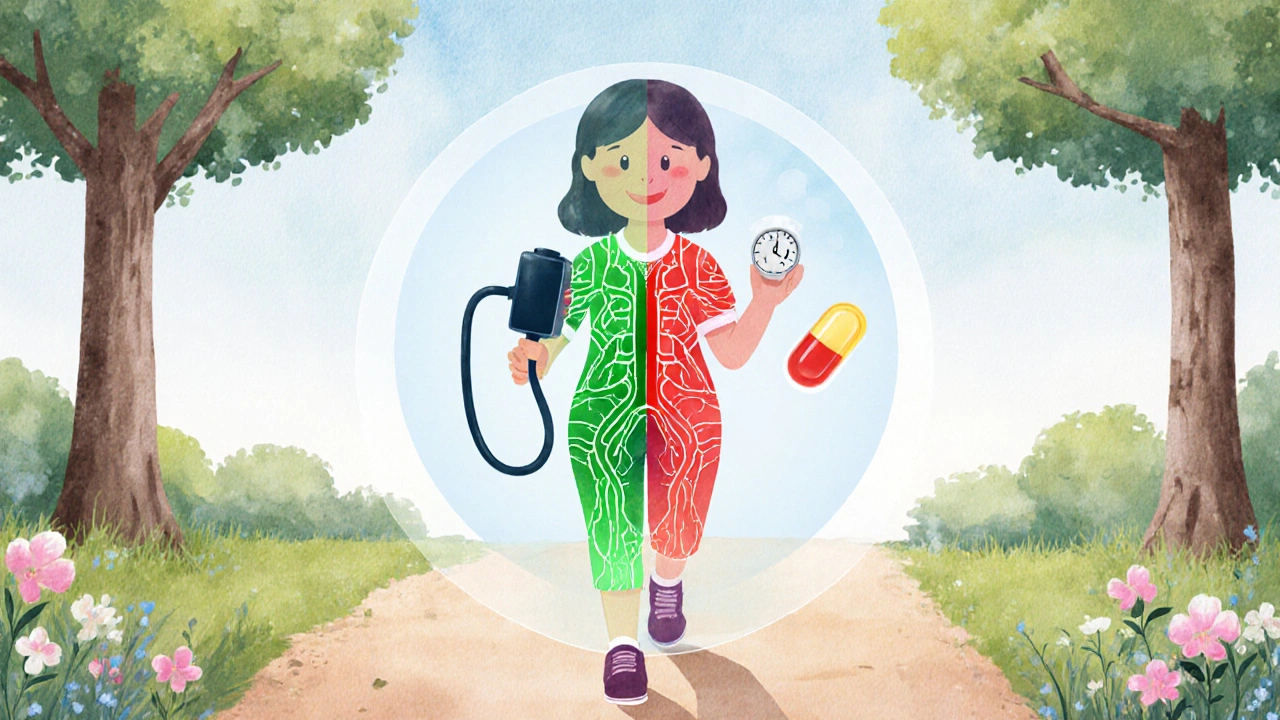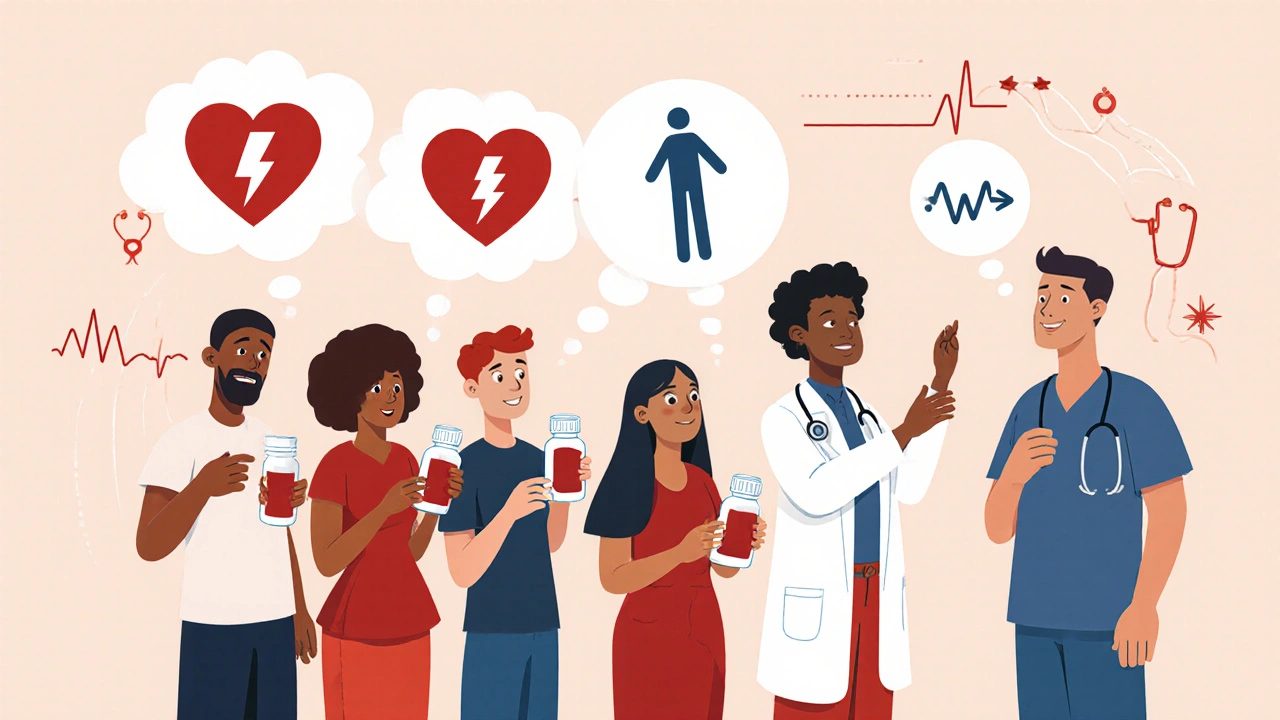Medication Side Effect Checker
Results
Many people take medications to manage chronic conditions-depression, high blood pressure, heart disease, prostate issues-and assume the trade-offs are worth it. But one major consequence often goes unmentioned until it’s too late: sexual side effects. If you’ve noticed a drop in desire, trouble getting or keeping an erection, delayed or absent orgasm, or reduced pleasure during sex, you’re not alone. And it’s likely not just in your head-it could be your medicine.
Antidepressants Are the Biggest Culprit
When it comes to sexual side effects, antidepressants top the list. About 40% of people taking them experience some kind of sexual problem, according to decades of clinical research. But not all antidepressants are the same. Some are far more likely to cause trouble than others. Selective serotonin reuptake inhibitors, or SSRIs, are the most common type of antidepressant. These include fluoxetine (Prozac), sertraline (Zoloft), paroxetine (Paxil), and fluvoxamine (Luvox). Among them, paroxetine carries the highest risk-up to 65% of users report sexual dysfunction. That means more than half of people taking it may notice a drop in libido, trouble reaching orgasm, or erectile issues. Sertraline isn’t far behind at 56%, and fluoxetine at 54%. Why does this happen? SSRIs increase serotonin levels in the brain, which helps with mood-but serotonin also blocks pathways involved in sexual arousal and orgasm. The more serotonin builds up, the harder it becomes for your body to respond sexually. Tricyclic antidepressants like imipramine affect about 30% of users, but clomipramine is even worse-nearly all patients in one study reported total or partial inability to orgasm. On the flip side, bupropion (Wellbutrin) and mirtazapine (Remeron) have much lower rates of sexual side effects. Many doctors now recommend these as first-line options for patients who’ve had problems with SSRIs or who are already sexually active and want to avoid disruption.Heart Medications Can Kill Your Sex Drive
High blood pressure and heart disease are serious, and the meds that treat them can be too. Thiazide diuretics like hydrochlorothiazide (Microzide) are the most common cause of erectile dysfunction among blood pressure drugs. Beta blockers like atenolol and propranolol also interfere with blood flow and nerve signals needed for arousal. For women, the impact is different but just as real. Up to 41% report reduced sexual desire, and 34% say sex feels less pleasurable. Alpha-blockers like clonidine and prazosin, sometimes used for hypertension or PTSD, can lower desire even further. But here’s something surprising: not all heart meds hurt your sex life. Angiotensin II receptor blockers like valsartan have actually been linked to improved sexual desire and fantasies in women compared to beta blockers. If you’re on blood pressure meds and noticing problems, talk to your doctor about switching to a class that’s less likely to cause sexual side effects.Prostate and Hormone Drugs: A Trade-Off Many Don’t Expect
Men taking medications for enlarged prostates or prostate cancer often don’t realize how deeply these drugs affect their sexual function. 5-alpha reductase inhibitors like finasteride (Propecia) and dutasteride (Avodart) block the hormone DHT, which helps shrink the prostate-but also reduces libido, causes erectile dysfunction, and can lead to problems with ejaculation. Studies show 5.9-15.8% of men on these drugs lose interest in sex, 5.1-9% develop erectile dysfunction, and up to 21.4% have trouble with ejaculation. These aren’t rare side effects-they’re expected outcomes. Even worse are antiandrogens like bicalutamide, used in prostate cancer treatment. Nearly all men on these drugs experience complete loss of libido, erectile dysfunction, and sometimes breast enlargement (gynecomastia). These effects are so predictable that doctors now recommend counseling before starting treatment. Knowing what’s coming helps men adjust emotionally and plan for intimacy differently.
Other Surprising Offenders
You might not think about epilepsy or pain meds when it comes to sex-but they’re on the list. Gabapentin and pregabalin, used for nerve pain and seizures, can cause erectile dysfunction by raising sex hormone-binding globulin and lowering free testosterone. Opioids like oxycodone and morphine disrupt the hypothalamic-pituitary-gonadal axis, leading to low testosterone and erectile problems. This isn’t just about addiction-it’s a direct hormonal effect. Even acid reflux meds like proton pump inhibitors (PPIs) and H2 blockers have been linked to reduced libido and erectile issues in some patients. The exact mechanism isn’t clear, but it’s enough that doctors are starting to ask about sexual health when prescribing long-term PPIs.What You Can Do About It
The first step? Don’t stop your meds on your own. Stopping antidepressants or blood pressure drugs suddenly can cause serious withdrawal, rebound high blood pressure, or even seizures. Instead, talk to your doctor. Bring up your concerns openly. Many patients don’t mention sexual side effects because they feel embarrassed or think it’s not important. But your doctor needs to know. Here are real, practical options:- Switch medications. If you’re on paroxetine, ask about switching to bupropion or mirtazapine. If you’re on a beta blocker, consider switching to an ARB like valsartan.
- Adjust the dose. Sometimes lowering the dose reduces side effects without losing therapeutic benefit.
- Try a "drug holiday." For some SSRIs, taking a break on weekends under medical supervision can help restore sexual function.
- Add a helper drug. Sildenafil (Viagra) or tadalafil (Cialis) can be effective for SSRI-induced erectile dysfunction-studies show 74-95% success rates.
- Change when you take it. Taking your SSRI after sex instead of before may reduce interference with arousal and orgasm.
- Exercise regularly. Physical activity improves blood flow, boosts testosterone, and can counteract some sexual side effects.

It’s Not Just Physical-It’s Emotional Too
Sexual side effects don’t just affect your body-they hurt relationships, self-esteem, and mental health. A man who can’t get an erection may feel like a failure. A woman who no longer feels desire might think something’s wrong with her. And if you’re already dealing with depression or anxiety, these side effects can make things worse. That’s why it’s crucial to separate the side effect from the illness. Depression itself causes sexual problems in up to 70% of patients. So if you’re on an SSRI and your sex drive drops, is it the depression or the drug? Sometimes both. That’s why doctors now screen for sexual health during mental health checkups.What’s Changing in 2025
The medical world is finally catching up. The FDA now requires drug manufacturers to report sexual side effects in clinical trials for CNS medications. The American Urological Association recommends routine screening for sexual dysfunction in patients on long-term antidepressants, antihypertensives, or prostate drugs. Newer antidepressants are being developed to target mood without flooding the brain with serotonin. Some are already in late-stage trials. Meanwhile, research into genetic factors that make some people more prone to sexual side effects could lead to personalized prescribing-testing your DNA before choosing a medication to avoid the ones most likely to hurt your sex life.Bottom Line: Speak Up, Stay Informed
Sexual side effects from medications are common, well-documented, and treatable. But they won’t get better unless you bring them up. Your doctor can’t fix what they don’t know is broken. If you’re on any of these medications and noticing changes in your sexual health, write down your symptoms: when they started, how often they happen, and how they’re affecting your life. Bring that list to your next appointment. Ask: "Is this a known side effect? Are there alternatives?" You deserve to feel well-not just physically, but emotionally and intimately too.Can antidepressants cause permanent sexual side effects?
In most cases, sexual side effects from antidepressants go away after stopping the medication. However, a small number of people report persistent issues-sometimes called Post-SSRI Sexual Dysfunction (PSSD)-that last months or even years after discontinuation. This is rare but real. If symptoms don’t improve after stopping the drug, consult a specialist in sexual medicine. Research into PSSD is ongoing, and treatment options are limited but evolving.
Do all SSRIs cause the same level of sexual dysfunction?
No. SSRIs vary widely in their sexual side effect profiles. Paroxetine (Paxil) has the highest risk at about 65%, followed by fluvoxamine (Luvox) at 59%. Sertraline (Zoloft) and fluoxetine (Prozac) are slightly lower at 56% and 54%, respectively. Escitalopram (Lexapro) and citalopram (Celexa) tend to have lower rates, though still significant. Bupropion (Wellbutrin) and mirtazapine (Remeron) are not SSRIs and carry much lower risks, making them preferred choices for patients concerned about sexual health.
Can blood pressure meds cause low libido in women?
Yes. Women on antihypertensive medications, especially beta blockers and diuretics, commonly report decreased sexual desire (up to 41%) and reduced sexual pleasure (34%). This is due to reduced blood flow, lower hormone levels, and nerve interference. Some medications, like angiotensin II receptor blockers (e.g., valsartan), have been shown to improve sexual desire in women compared to other blood pressure drugs. If you’re a woman experiencing low libido on blood pressure meds, ask your doctor about switching to an ARB.
Is it safe to take Viagra with antidepressants?
Yes, in most cases. Sildenafil (Viagra) and tadalafil (Cialis) are commonly prescribed to treat erectile dysfunction caused by SSRIs. Studies show 74-95% of men with SSRI-induced erectile dysfunction respond well to these drugs. However, always consult your doctor before combining medications. Some combinations may affect blood pressure or interact with other drugs you’re taking. Never buy these medications online without a prescription.
Why don’t doctors talk about sexual side effects more often?
Many doctors assume patients won’t bring it up, or they’re pressed for time during appointments. Some feel uncomfortable discussing sex, while others believe the side effects are inevitable. But research shows that when doctors ask directly, patients are more likely to report problems-and more likely to stick with treatment when solutions are offered. Ask your doctor: "What are the sexual side effects of this medication?" It’s a valid, important question.
Can lifestyle changes help reduce medication-related sexual side effects?
Yes. Regular exercise improves blood flow, boosts testosterone, and enhances mood-all of which help counteract sexual side effects. Losing excess weight, reducing alcohol intake, and quitting smoking can also improve sexual function. Stress management techniques like mindfulness and therapy can help, especially if depression or anxiety is contributing to low desire. While lifestyle changes won’t reverse all medication effects, they can make a meaningful difference.

Matthew Kwiecinski
Paroxetine is a sexual function killer. I was on it for six months and lost all desire, then couldn't climax even when I wanted to. Switched to bupropion and my sex life came back like flipping a switch. Doctors need to stop prescribing SSRIs like candy.
Manuel Gonzalez
Had the same thing happen with sertraline. Took me three months to work up the nerve to tell my psychiatrist. She was shocked I hadn't brought it up sooner. Turns out she's been switching patients to Wellbutrin left and right for this exact reason. You're not weird for noticing - you're smart for speaking up.
Brittney Lopez
As a woman on beta blockers for hypertension, I didn't realize my lack of interest was medication-related until my partner mentioned it. We both assumed it was stress or aging. Switched to valsartan and suddenly, I wanted to be touched again. This post saved my marriage.
Andy Ruff
Look, if you're taking antidepressants and complaining about your sex life, maybe you shouldn't be taking them in the first place. Depression is a disease that makes you selfish and detached - and now you're mad because the medicine that saves your life also makes you less horny? Grow up. Sex isn't a right, it's a privilege for people who aren't drowning in their own neurochemistry. If you want to feel like a man again, fix your brain first, not your pills.
And don't even get me started on men who blame their meds for erectile issues. You're 42, sit on the couch watching Netflix, eat fast food for dinner, and then wonder why you can't get it up? It's not the SSRI - it's your lifestyle. You're weak. Fix yourself.
Also, Viagra? Please. That's just a temporary fix for a permanent failure. Real men don't need chemical crutches. They fix their diet, their sleep, their stress. They don't pop blue pills like candy while their wife cries in the other room.
Justin Vaughan
Just want to say - if you're reading this and feeling ashamed because your meds are messing with your sex life, you're not broken. You're human. And you're not alone. I was on Paxil for two years, lost all libido, and felt like a ghost in my own body. I almost quit therapy because I thought I was failing at being 'fixed.' But when I finally told my doctor, she didn't judge - she gave me options. We switched me to mirtazapine, added daily walks, and now I'm back to feeling like me. It took time, but it happened. You deserve to feel whole - physically, emotionally, and intimately. Don't let stigma silence you. Talk to someone. Start with your doctor. Or even just a friend. You've got this.
Keerthi Kumar
I’m from India, and in my culture, we never talk about sex - not even with doctors. But when I started on fluoxetine for anxiety, I noticed everything changed - no desire, no pleasure, just numbness. I was too embarrassed to say anything... until I found this article. I showed it to my doctor, and she was surprised - she didn’t know SSRIs affected women this way here too. We switched me to escitalopram, and slowly, things improved. I’m not just grateful for the science - I’m grateful for people like you, sharing this. Thank you. It’s okay to speak up. Even here, even now.
Jens Petersen
Let’s be real - Big Pharma doesn’t care about your libido. They make billions off SSRIs, and sexual dysfunction? That’s just a footnote in the 100-page insert nobody reads. They know if you stop taking it, you might relapse into depression - and then you’ll come crawling back. Meanwhile, your wife leaves, your confidence implodes, and your therapist bills you $200/hour to talk about why you can’t get hard. It’s not a side effect - it’s a business model. They sell mood stabilizers, and your sexual health is collateral damage. Wake up. The system doesn’t want you healthy - it wants you compliant.
Dade Hughston
bro i took zoloft for 8 months and i couldnt cum at all like at all not even when i was jerking off and i thought i was broken forever and then i quit cold turkey and now i have like 3x the libido and i feel like a teenager again but my therapist says i shouldnt have done that but like who cares i got my life back
Jim Peddle
Notice how the article never mentions that 70% of men who report SSRI-induced ED were already struggling with performance anxiety before starting meds. The drug didn't cause it - it exposed it. The medical industry wants you to believe your body is broken by pills, not by decades of porn, insecurity, and emotional repression. They profit from the narrative of pharmacological blame. Meanwhile, real solutions - therapy, mindfulness, intimacy work - are buried under layers of chemical Band-Aids. Don't be fooled. The real problem isn't serotonin - it's your relationship with desire.
S Love
If you’re reading this and feeling alone - you’re not. I’ve been there. I’ve been the guy who stopped kissing his partner because he was too ashamed. I’ve been the one who lied and said he was just tired. But here’s the truth: your health matters - all of it. And your doctor isn’t a mind reader. The more you speak up, the more power you take back. Don’t wait for them to ask. Bring the list. Write it down. Say it out loud. Your body deserves to be heard. And you? You deserve to feel whole again.